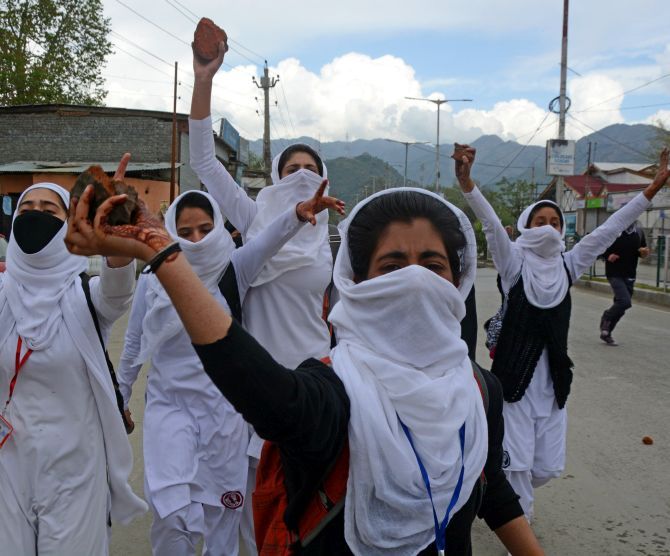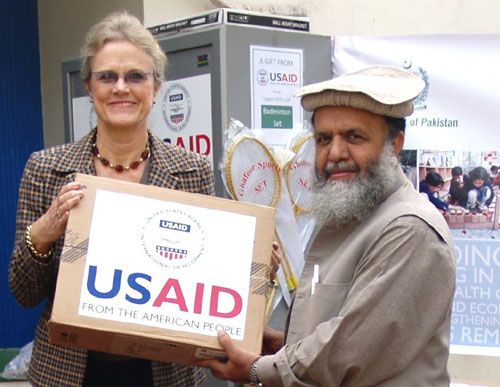'It is not possible that Kashmir will go totally to one country.'
'I don't see borders being changed anytime even in the distant future.'

Robin Raphel -- the first United States assistant secretary of state for South Asia and Central Asia affairs -- was an American diplomat Indian diplomats of the 1990s despised.
They felt Raphel talked down to India, they alleged that she meddled in Kashmir and claimed she was pro-Pakistan.
Two decades after her stint in the US state department, Raphel's name can get Indian diplomats of a certain vintage in a froth.
In an exclusive and rare interview, Raphel -- who also served as an advisor to then secretary of state Hillary Clinton -- spoke to Pervez Majeed in Washington, DC. The second of a three-part interview.
- Part 1 of the Robin Raphel interview: 'India and Pakistan need to get along'
'The US should urge India and Pakistan to get Kashmir on the agenda and stop coming up with excuses as to why they can't talk about it.'
When you were assistant secretary of state, did the Clinton administration offer any proposal to India and Pakistan regarding the Kashmir issue?
No. We did not have our own proposals. We rather were urging both sides to put Kashmir on top of the agenda because after all, it is an underlying problem that needs to be resolved.
Secondly, we were trying to understand what was going on in Kashmir and what was actually the will of the people. For that purpose we were meeting and talking to people.
In your view what role should the US play to persuade India and Pakistan to resolve Kashmir?
See, the US has deep and non-contentious relations with both countries and both are important for us in various ways.
So as a rational diplomat, I think we should be strictly urging both countries to get Kashmir on the agenda and stop coming up with excuses as to why they can't talk about it.
If they do agree to talk on Kashmir, what can be the possible solution?
Well, again I have to emphasise that it is not for outsiders to say; yet I believe it is not possible that Kashmir will go totally to one country. That doesn't seem practical.
I don't see borders being changed anytime even in the distant future.
Moreover, I think the division (of erstwhile J&K state) is not what is causing the problem so much now.
Why are people on the streets in Kashmir? Because in their perspective the Government of India is behaving in an oppressive way.
I think in order to get to a solution Delhi has to take the first step; it has to come to an accommodation with the Kashmiris and then with Pakistan.

Some quarters in Kashmir have been saying that the US discussed some proposal with the (assassinated) Hurriyat leader Abdul Gani Lone during his visit to the country in May 2002. Do you know anything about that?
I am not aware of any specific plans that were shared with Mr Lone. As I said, there was never a formal US government proposal.
We met with various Kashmiri leaders and assured them of the US government position which was that whatever a settlement is there, it should fully take into account the views of the Kashmiri people.
Of course, we always used to tell them that you need to take your views to the government in Delhi. That was also our constant message to them.
Recently, the US designated the Hizbul Mujahideen a global terrorist organisation and its chief Syed Salahuddin a global terrorist. What kind of impact do you think these decisions can have on insurgency in Kashmir?
I believe whether such groups are designated or not designated is not really the main point. These 'designations' should not be the main focus.
This designation of terrorist groups or individuals has become highly political in a way and yet it is difficult to say if someone has led an insurgency or been involved in any kind of terrorism...
Anyway, I mean this shouldn't prevent leaders on either side in India, Pakistan and Kashmir from being willing to talk to one another.
Pakistan has criticised the US, arguing that militancy in Kashmir is an 'indigenous freedom struggle'. What are your views?
(After a long pause) Absolutely, to a degree. In this sense that people have genuine grievances and frustrations that very understandably a desire to fight back which can be called an insurgency.
And when you have this problem, that one man's terrorist is another man's freedom-fighter... That applies to many places and certainly to Kashmir.
So there is no doubt that there are plenty of causes in Kashmir for people to be frustrated...
Since long years they have lived with a large number of security forces. And the natural abuses that come out of that.
So my understanding really is that it (the militancy in Kashmir) is largely indigenous.
Obviously, it is being supported by outsiders from time to time including by Pakistan.
Pakistan, particularly in the late 1980s, took advantage of the situation which was already happening in Kashmir, again because of Indian mismanagement.
Pakistan took advantage of that situation which in my view and in the views of the US government was wrong, but Pakistan didn't start the insurgency.
So against this backdrop the militancy in Kashmir is indigenous to a degree.
IMAGES: TOP: Young Kashmiri women hurl stones at security forces in Srinagar. Photograph: Umar Ganie.
BOTTOM: Robin Raphel, left, in Pakistan during her stint as an advisor to the US state department when Hillary Clinton was secretary of state. Photograph: Kind courtesy, US embassy in Pakistan











 © 2025
© 2025